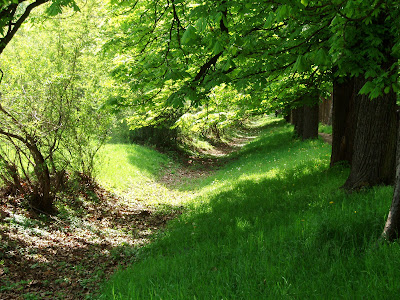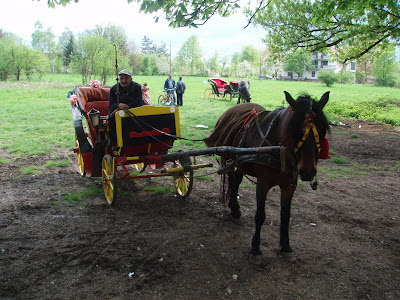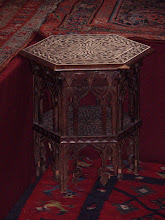




BiH = Bosnia i Herzegovina




 The transparent waters of Vrelo Bosna and the colors of spring are a delight for the eyes. In the cute wooden restaurant you can even have a trout fresh out of the water. One advice however, try to avoid going on the week-end or worse on 1rst of may when all Sarajevo seems to gather there for barbecue!
The transparent waters of Vrelo Bosna and the colors of spring are a delight for the eyes. In the cute wooden restaurant you can even have a trout fresh out of the water. One advice however, try to avoid going on the week-end or worse on 1rst of may when all Sarajevo seems to gather there for barbecue! 


 To reach Vrelo Bosna , the springs of the river Bosna (from which Bosnia derives its name) you can drive there directly or take a more leisurely approach and choose to walk or take a carriage on the alleys bordered by majestic trees and preserved nature. These springs provide drinking water for Sarajevo and beyond therefore the water authorities try to keep pollution away.
To reach Vrelo Bosna , the springs of the river Bosna (from which Bosnia derives its name) you can drive there directly or take a more leisurely approach and choose to walk or take a carriage on the alleys bordered by majestic trees and preserved nature. These springs provide drinking water for Sarajevo and beyond therefore the water authorities try to keep pollution away.
In the film Valter brani Sarajevo (Valter saves Sarajevo), the German General - the Germans are trying to find Valter in Sarajevo - looking down to Sarajevo from the top of one of the hills, famously says: "Sehen Sie diese Stadt? Das ist Walter" (Do you see this city? It is Valter).
Pas loin de Skenderija, au bord de la rivière, en face de la banque Raiffeisen on peut voir un square entrenu amoureusement par les jardiniers de la ville avec en son centre le buste de Valdimir ˝Valter˝ Perić héros de la résistance pendant la deuxième guerre mondiale. Né en 1919 dans l'actuelle Serbie, il travaille à Sarajevo d'où il adhère au parti communiste avant de se méler à l'action combattante en rejoignant les partisans dans la région de Zénica puis en commandant la 6ème brigade de Bosnie orientale. En 1943, de retour à Sarajevo pour mener des opérations clandestines de sabotage, il meurt le 6 avril 1945, jour de la libération de Sarajevo. Une fin tragique digne d'un vrai héros.
Dans le fil Valter brani Sarajevo (Valter sauve Sarajevo), le général allemand qui recherche Valter dans Sarajevo dit du haut des collines surplombant la ville ˝ Sehen Sie diese Stadt? Das ist Walter" (Vous voyez cette ville? C'est Valter).
 Yes, this beautiful virus has hit our family. Classes in school were half empty. The changing weather once day with bright sun and 24 °C and the next rain and 4°C has been though an our immune system just gave in.
Yes, this beautiful virus has hit our family. Classes in school were half empty. The changing weather once day with bright sun and 24 °C and the next rain and 4°C has been though an our immune system just gave in.
 For a foreigner one of the most stricking things about Sarajevo is to hear the call to prayer five times a day from the minarets of mosques. For those who live here it, whatever their religion, it quickly becomes a feature of the day, reminded you of the passing time. Many I know miss hearing it when they move out. Although a lot of people say ˝it was always so˝ there is a begining to everything. The first call to prayer was uttered by Bilal ibn Rabah sometimes known as "Bilal al-Habashi" who was an Ethiopian born in slavery in Mecca in the late 6th century, sometime between 578 and 582. Stories say that Bilal had accepted Islam secretly and once his master (an ennemy of Islam) learned about it he was persecuted. However, prophet Muhammad heard about him and asked Abu Bakr to buy him and free him. Bilal was known for his beautiful voice and prophet Muhammad chose him to call people to prayer making him effectively the first muezzin in history. Bilal could not pronounce the Arabic letter 'sheen' properly and instead used the letter 'seen' (the two sounds had merged in "s" in classical Ge'ez an old Ethiopian language). So some people complained and suggested that someone else should call for prayer. Prophet Muhammad then said, "The 'sin' of Bilal is 'shin' in the hearing of God," underlying that the value of a man's prayer is not his pronounciation but the purity of his heart. He died sometime between 638 to 642.
For a foreigner one of the most stricking things about Sarajevo is to hear the call to prayer five times a day from the minarets of mosques. For those who live here it, whatever their religion, it quickly becomes a feature of the day, reminded you of the passing time. Many I know miss hearing it when they move out. Although a lot of people say ˝it was always so˝ there is a begining to everything. The first call to prayer was uttered by Bilal ibn Rabah sometimes known as "Bilal al-Habashi" who was an Ethiopian born in slavery in Mecca in the late 6th century, sometime between 578 and 582. Stories say that Bilal had accepted Islam secretly and once his master (an ennemy of Islam) learned about it he was persecuted. However, prophet Muhammad heard about him and asked Abu Bakr to buy him and free him. Bilal was known for his beautiful voice and prophet Muhammad chose him to call people to prayer making him effectively the first muezzin in history. Bilal could not pronounce the Arabic letter 'sheen' properly and instead used the letter 'seen' (the two sounds had merged in "s" in classical Ge'ez an old Ethiopian language). So some people complained and suggested that someone else should call for prayer. Prophet Muhammad then said, "The 'sin' of Bilal is 'shin' in the hearing of God," underlying that the value of a man's prayer is not his pronounciation but the purity of his heart. He died sometime between 638 to 642.
 This Sunday the International Women's club of Sarajevo organised a 4 km fund-raiser walk to buy a mammogram for one of the hospitals in Sarajevo. It was also a good occasion to raise awareness about early detection. We walked with the team of the French School which included young old and dog.
This Sunday the International Women's club of Sarajevo organised a 4 km fund-raiser walk to buy a mammogram for one of the hospitals in Sarajevo. It was also a good occasion to raise awareness about early detection. We walked with the team of the French School which included young old and dog.







